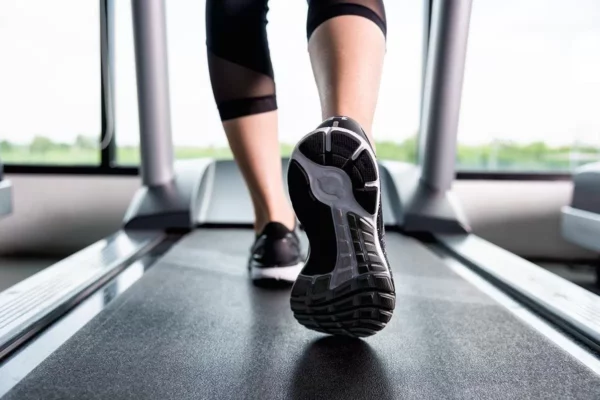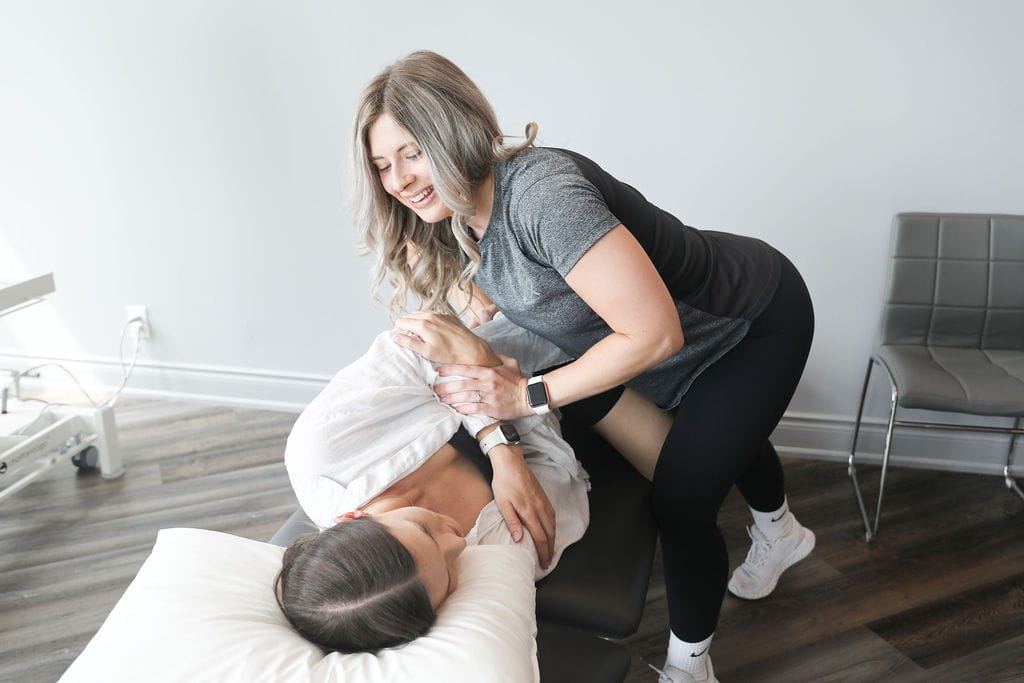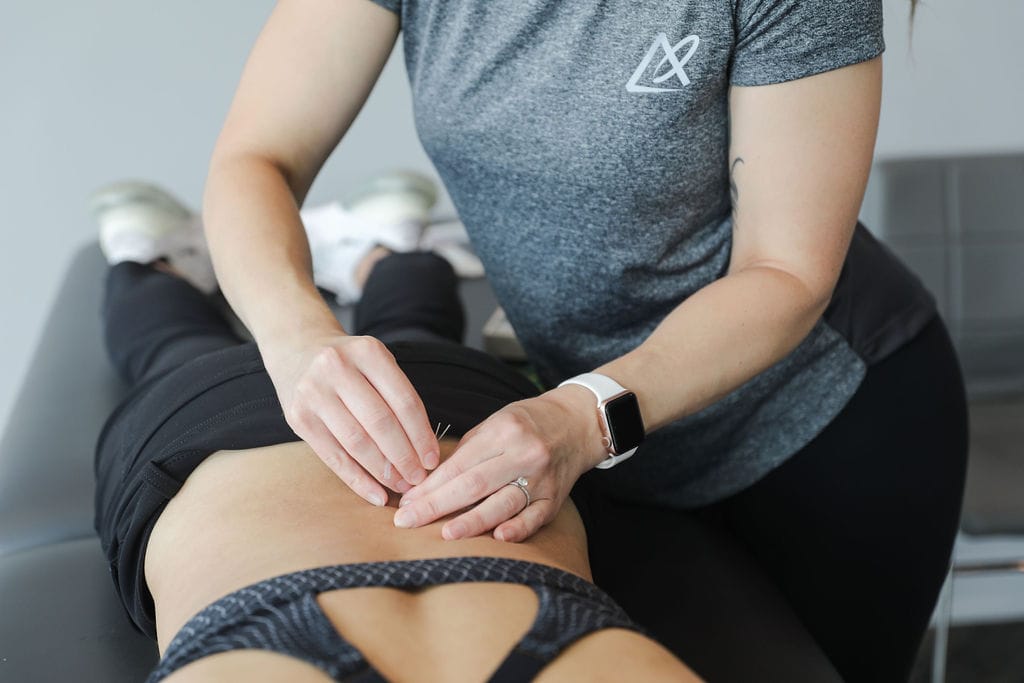Pelvic Health physiotherapists advocate the importance of educating individuals about their pelvic health. They are often asked by patients if an internal exam is necessary. Many patients refrain from seeking help for pelvic health issues because of the fear of internal examination. While internal exams are not a must, they can be very helpful to pelvic health physiotherapists in determining the condition of the pelvic floor.
What is an Internal Pelvic Exam?
A pelvic floor assessment, which may or may not include an internal pelvic exam, entails a pelvic health physiotherapist examining the pelvic floor muscles, tissues, and organs by inserting a gloved hand into the vagina or rectum. This examination is crucial for assessing the well-being and performance of the pelvic floor, allowing for the detection of any possible problems or issues.
Why is an internal pelvic exam important?
- Detailed Assessment of Pelvic Floor Muscles: An internal pelvic exam allows the physiotherapist to assess the tone, strength, flexibility, and coordination of the pelvic floor muscles. This information is crucial in developing an accurate understanding of the patient’s pelvic health.
- Identification of Muscle Imbalances: Through internal palpation, a physiotherapist can identify any muscle imbalances or asymmetries in the pelvic floor. This helps in tailoring the treatment plan to address specific issues, such as hypertonic (overactive) or hypotonic (underactive) muscles.
- Assessment of Pelvic Organ Function: Internal examination enables the physiotherapist to assess the function of pelvic organs, such as the bladder, uterus, and rectum. This is important in cases where dysfunction or weakness in the pelvic floor muscles may be contributing to issues such as urinary incontinence or pelvic organ prolapse.
- Evaluation of Connective Tissues and Nerves: The internal exam allows the physiotherapist to assess the condition of connective tissues, ligaments, and nerves in the pelvic region. Dysfunction in these structures can contribute to pelvic pain and other symptoms, and the internal exam helps in identifying such issues.
- Assessment of Trigger Points and Tenderness: The physiotherapist can identify trigger points and areas of tenderness within the pelvic floor muscles. This information is crucial in designing a targeted treatment plan, which may include manual therapy techniques to release muscle tension.
- Feedback on Exercise Performance: During an internal pelvic exam, the physiotherapist may guide the patient through specific exercises to assess the effectiveness of pelvic floor muscle contractions. Real-time feedback helps the patient learn proper muscle engagement and control.
- Patient Education and Empowerment: The internal exam provides an opportunity for the physiotherapist to educate the patient about their pelvic floor anatomy, function, and any specific issues identified during the assessment. This empowers the patient to actively participate in their treatment plan and make lifestyle changes that support pelvic health.
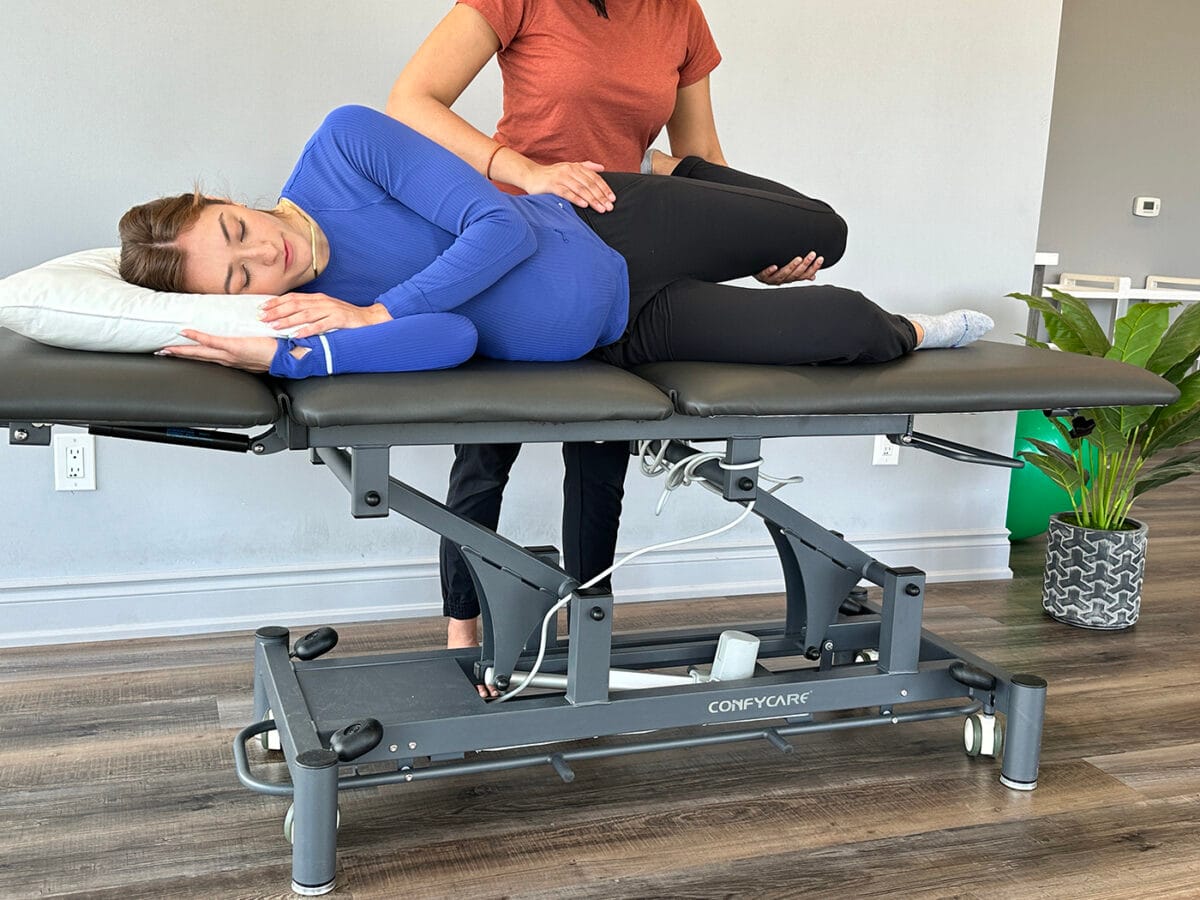
Do I have to have an internal exam during a pelvic health assessment?
It’s important to note that internal pelvic exams are conducted with the patient’s informed consent, and physiotherapists ensure a comfortable and respectful environment during the assessment. The goal is to provide comprehensive care and address the specific needs of individuals experiencing pelvic health issues. That being said, if you are not comfortable being internally examined, please let your physiotherapist know before the start of your assessment.
How do I prepare for an internal pelvic exam?
Preparing for an internal pelvic exam involves a combination of physical and mental preparation. It’s essential to communicate openly with your pelvic health physiotherapist and follow their instructions. Here are some general guidelines to help you prepare:
Comfortable Clothing: Wear comfortable, easy-to-remove clothing. You may be asked to undress from the waist down, so wearing a skirt or loose pants can be convenient.
Relaxation Techniques: Practice relaxation techniques such as deep breathing to help ease anxiety and tension. Relaxing your pelvic muscles can make the exam more comfortable.
Communicate with your Physiotherapist: Inform your pelvic health physiotherapist about any concerns, fears, or past traumatic experiences related to pelvic exams. They can adjust their approach and provide additional support.
Ask Questions: Feel free to ask any questions you may have about the procedure. Knowing what to expect can help alleviate anxiety.
Where can I find a pelvic health physiotherapist in Mississauga?
We have 8 locations with pelvic health physiotherapists to help you.
- Pelvic Health Physiotherapy Etobicoke – Triangle Physiotherapy Etobicoke
- Oakville Pelvic Health – Triangle Physiotherapy Oakville
- Pelvic Health Physiotherapy North York – Triangle Physiotherapy North York
- Mississauga Pelvic Health – Triangle Physiotherapy Mississauga
- Downtown Pelvic Health – Triangle Physiotherapy King West
- Uptown Toronto Pelvic Health – Triangle Physiotherapy Lawrence Park
- Pelvic Physiotherapy Downtown Toronto – Triangle Physiotherapy Queens Quay
- Mississauga Pelvic Health – Triangle Physiotherapy Erin Mills
Understanding the need for an internal exam during a pelvic health assessment can help you make informed decisions about your care. If you’re looking for specialized support, consider physiotherapy in Etobicoke, Oakville, North York, Toronto, Lawrence Park, Queens Quay, Erin Mills, Mississauga, or Liberty Village. Experienced physiotherapists in these areas can provide comprehensive pelvic health assessments tailored to your comfort and needs.
Winter weather can be challenging for individuals with arthritis, as cold temperatures and changes in atmospheric pressure can exacerbate joint pain and stiffness. Here are 10 tips to help manage arthritis during the winter months:
- Stay Warm:
- Start your day by using a heating pad or a warm bath or shower to increase the mobility in your joints and reduce pain before you go about your day.
- Dress in layers to trap heat and stay warm.
- Use heated blankets or warm packs on achy joints.
- Protect Your Joints:
- Wear gloves to keep your hands warm and protect your finger joints.
- Use knee-high socks and warm footwear to keep your feet and ankles insulated.
- Stay Active:
- Engage in gentle exercises to keep your joints flexible.
- Consider indoor activities like swimming, which is easy on the joints.
- Maintain a Healthy Weight:
- Excess weight can put more pressure on your joints, so try to maintain a healthy weight through a balanced diet and regular exercise.
- Stay Hydrated:
- Cold weather can lead to dehydration, which may worsen arthritis symptoms. Drink plenty of water to stay hydrated.
- Use Assistive Devices:
- Consider using assistive devices such as canes or braces to reduce the strain on affected joints.
- Manage Stress:
- Stress can exacerbate arthritis symptoms. Practice stress-reducing techniques like deep breathing, meditation, or yoga.
- Warm Up Before Activities:
- Before heading outdoors, warm up your body with gentle stretching exercises to prepare your joints for movement.
- Take Warm Baths:
- Soaking in a warm bath can help soothe joint pain and relax your muscles.
- Consult Your Doctor:
- Keep your healthcare provider informed about changes in your symptoms and discuss any concerns you have about managing arthritis in the winter.

Remember, it’s essential to tailor these tips to your specific situation, as arthritis can affect individuals differently. Always consult with your healthcare provider for personalized advice and treatment options.
How do I book an appointment with a Physiotherapist near me?
Click HERE to book an appointment with a physiotherapist or chiropractor at one of our eight locations.
- Physiotherapy Etobicoke – Triangle Physiotherapy Etobicoke
- Oakville Physiotherapy Clinic – Triangle Physiotherapy Oakville
- Physiotherapy North York – Triangle Physiotherapy North York
- Mississauga Physiotherapy Clinics – Triangle Physiotherapy Mississauga
- Downtown Physiotherapy Clinics – Triangle Physiotherapy King West
- Uptown Physiotherapy Clinics – Triangle Physiotherapy Lawrence Park
- Physiotherapy Clinic Downtown Toronto – Triangle Physiotherapy Queens Quay
- Physiotherapy Clinics Mississauga – Triangle Physiotherapy Erin Mills
“Winter weather can be challenging for those with arthritis, but with the right care, you can manage your symptoms effectively. Triangle Physiotherapy offers expert services across the GTA, including Physiotherapy in Etobicoke, Oakville, North York, Toronto, Lawrence Park, Queens Quay, Erin Mills, Mississauga, and Liberty Village. Our skilled physiotherapists can help you develop strategies to stay active and pain-free during the colder months.”
There are a lot of unknowns when going into labour and delivery. Whether it’s your first, second, or third child, every birth is very different, and daunting in its way. Some women hope to have a vaginal delivery, while others schedule or have emergency C-sections. Both forms of delivery are viable options however they can have different effects on your body postpartum. A cesarean section (C-section) can be life-saving for both the baby and mom. A common misconception is that a C-section is somehow “easier” but that is far from the truth. A C-section is a major surgery, that not only affects your abdominal muscles but also your pelvic floor. In this blog post, we will explore what C-sections are, their impact on the pelvic floor, and the benefits of pelvic floor physiotherapy for women who have had C-sections.
What is a C-section?
A C-section is a surgical procedure that involves delivering a baby through an incision made in the mother’s abdomen and uterus. It is usually performed either if the mother schedules a C-section, which may be for a variety of reasons, or in the case of an emergency. This may be done to save and protect the mother and baby. Some reasons for a C-section include a large baby, breech position, multiple pregnancies, maternal health conditions such as high blood pressure (preeclampsia), or labor not progressing as expected (dilation plateauing).
What impact does a C-Section have on the pelvic floor?
Many people assume that a C-section does not have any impact on the pelvic floor because the baby does not pass through the vagina. However, the pelvic floor can still be affected during a C-section. During the procedure, the surgeon may need to move the bladder and intestines to access the uterus, which can cause temporary weakness and stretching of the pelvic floor muscles. The stretching can also occur due to the weight of the baby pushing down on the pelvic floor during pregnancy. The procedure can also impact the nerves supplying the bladder and bowel, thereby reducing or completely removing your urge to pee. This altered sensation can improve over time, but may sometimes linger for years postpartum. In some cases, the sensation never comes back.
After the C-section, some women may experience pain and discomfort in the pelvic area, which can be exacerbated by activities such as lifting and carrying their newborn. This can lead to muscle tension and tightness, which can cause further issues down the line.
What are the benefits of pelvic floor physiotherapy after a C-section?
Pelvic floor physiotherapy is a specialized form of physical therapy that focuses on strengthening the pelvic floor muscles, improving their function and flexibility, and treating any pain or discomfort in the pelvic area. It can be very beneficial for women who have had a C-section, as it can help to address any issues that may have arisen due to the surgery.

How can healing and recovery be improved after a C-Section?
Pelvic floor physiotherapy can help to speed up the healing process after a C-section. It can help to reduce pain and swelling in the pelvic area, improve circulation, and promote tissue regeneration. It can also help to prevent the formation of scar tissue, which can cause discomfort and pain in the pelvic area. Keloid scarring is a type of scarring at the C section where the tissue raises and forms adhesions. This can be painful in some cases or uncomfortable and can impact sensation in the region.
- Address bladder and bowel issues
After a C-section, some women may experience bladder and bowel issues such as incontinence, urgency, or difficulty emptying their bladder or bowel. This may be a product of the nerves being impacted during the surgery or other factors. Pelvic floor physiotherapy can help to address these issues by strengthening the pelvic floor muscles and improving their function. It can also help to retrain the bladder and bowel to function properly and reduce incontinence.
- Improve sexual function
Many women may experience a decrease in sexual function after a C-section due to pain and discomfort in the pelvic area. This may be due to feelings of pelvic heaviness, perineum discomfort, or scar tissue. Pelvic floor physiotherapy can help to address these issues by reducing pain and discomfort and improving the function of the pelvic floor muscles. This can lead to an improvement in sexual function and overall sexual satisfaction.
Seeing a pelvic therapist post-C-section can also get you back to activities you love doing! This can include running, weight lifting, etc. There is no timeline for how quickly you should be recovering. Our bodies take time to heal postpartum. Your body is not broken, but working with a pelvic therapist can help you feel more like yourself again.
Where can I find a pelvic health physiotherapist in Mississauga?
We have 8 locations with pelvic health physiotherapists to help you.
- Pelvic Health Physiotherapy Etobicoke – Triangle Physiotherapy Etobicoke
- Oakville Pelvic Health – Triangle Physiotherapy Oakville
- Pelvic Health Physiotherapy North York – Triangle Physiotherapy North York
- Mississauga Pelvic Health – Triangle Physiotherapy Mississauga
- Downtown Pelvic Health – Triangle Physiotherapy King West
- Uptown Toronto Pelvic Health – Triangle Physiotherapy Lawrence Park
- Pelvic Physiotherapy Downtown Toronto – Triangle Physiotherapy Queens Quay
- Mississauga Pelvic Health – Triangle Physiotherapy Erin Mills
Seeing a pelvic floor physiotherapist after a C-section can be crucial for recovery and regaining strength. If you’re looking for specialized care, consider physiotherapy in Etobicoke, Oakville, North York, Toronto, Lawrence Park, Queens Quay, Erin Mills, Mississauga, or Liberty Village. Skilled physiotherapists in these locations can provide personalized post-C-section care to support your healing journey.
Running in the winter can be a great way to stay active, but it does require some adjustments to ensure safety and comfort in cold and potentially icy conditions.
Here are some tips for running in the winter:
1. Dress in Layers:
- Base Layer: Moisture-wicking fabric to keep sweat away from your skin.
- Insulating Layer: A warm layer to retain body heat. This can be fleece or a synthetic insulating material.
- Outer Layer: A waterproof and windproof jacket to protect against the elements.
2. Protect Extremities:
- Head: Wear a hat or headband to retain heat. A beanie that covers your ears can be especially helpful.
- Hands: Use insulated, waterproof gloves or mittens.
- Feet: Wear moisture-wicking socks and consider using gaiters to keep snow out of your shoes.
3. Choose the Right Footwear:
- Opt for running shoes with good traction to prevent slipping on ice or snow.
- You can also use traction devices that slip over your shoes for added grip.
4. Stay Visible:
- Winter days are often darker, so wear reflective gear or bright colors to ensure you’re visible to drivers.
5. Warm-Up Inside:
- Warm up your muscles indoors before heading out to minimize the shock of the cold on your body.
6. Plan Your Route:
- Stick to well-lit, well-traveled paths to ensure your safety.
- Avoid areas with heavy snow or ice accumulation.
7. Hydrate:
- Even in cold weather, it’s important to stay hydrated. Cold air can be dry, and you can still lose fluids through sweat.
8. Adjust Your Pace:
- Cold air can make breathing more challenging, so adjust your pace accordingly.
9. Listen to Your Body:
- If conditions are extreme, consider shortening your run or opting for an indoor workout.
10. Post-Run Care:
- Change out of wet clothes quickly to avoid getting chilled.
- Warm up gradually, and consider a hot shower to raise your body temperature.
11. Be Cautious of Ice:
- Watch for icy patches and adjust your stride to reduce the risk of slipping.
- If conditions are icy, consider using traction devices for your shoes.
12. Stay Informed About the Weather:
- Check the weather forecast before heading out, and be aware of changing conditions.
By following these tips, you can make your winter runs more enjoyable and safer. Always prioritize safety and listen to your body, adjusting your routine as needed based on the conditions.

How do I book an appointment for a Running Assessment near me?
Click HERE to book an appointment with a physiotherapist or chiropractor at one of our eight locations.
- Physiotherapy Etobicoke – Triangle Physiotherapy Etobicoke
- Oakville Physiotherapy Clinic – Triangle Physiotherapy Oakville
- Physiotherapy North York – Triangle Physiotherapy North York
- Mississauga Physiotherapy Clinics – Triangle Physiotherapy Mississauga
- Downtown Physiotherapy Clinics – Triangle Physiotherapy King West
- Uptown Physiotherapy Clinics – Triangle Physiotherapy Lawrence Park
- Physiotherapy Clinic Downtown Toronto – Triangle Physiotherapy Queens Quay
- Physiotherapy Clinics Mississauga – Triangle Physiotherapy Erin Mills
“Running in the winter requires special considerations to stay safe and injury-free. Triangle Physiotherapy offers expert services across the GTA, including Physiotherapy in Etobicoke, Oakville, North York, Toronto, Lawrence Park, Queens Quay, Erin Mills, Mississauga, and Liberty Village. Our skilled physiotherapists can help you maintain your running routine throughout the winter with personalized advice and injury prevention strategies.”
Winter is here and the snow is around the corner. The season for skiing is upon us. Whether you are a novice skier or experienced in the sport, there is always a possibility of an injury. This article talks about common skiing injuries and how you can recover from them.

What are some common snow sports injuries?
Some common injuries sustained during skiing are:
Head
- Concussion
- Traumatic brain injury
Neck & Shoulders
- Whiplash
- Fracture
- Torn rotator cuff
- Shoulder dislocation
Back & Spine
- Herniated disks
- Lower back pain
Hand
- Skier’s thumb
- Wrist sprain
- Finger fracture
Knees & Legs
- ACL/PCL rupture
- Meniscus injury
- Fracture
How can I protect my knees while skiing?
Using properly adjusted bindings, maintaining proper ski technique, and conditioning exercises to strengthen the muscles around the knee can help protect against knee injuries.
What is “snowboarder’s fracture”?
Snowboarder’s fracture refers to a fracture of the lateral process of the talus bone in the ankle, usually caused by an inversion injury when landing from a jump.
Are head injuries common in skiing?
Head injuries can occur in skiing, especially in the absence of helmets. Wearing a properly fitted helmet significantly reduces the risk of head injuries.
How do I know if I have a concussion from skiing?
Symptoms of a concussion may include headache, dizziness, nausea, confusion, sensitivity to light, and memory problems. If you suspect a concussion, it’s crucial to seek medical attention.
What do I do after I get injured while skiing?
No matter how minor the injury, it is advisable to seek a doctor or physiotherapist’s advice to make sure it does not get worse. A physiotherapist can assess the extent of your injury. Follow their advice and recommendations for treatment.
When should I seek medical help for a ski injury?
Seek medical help if you experience severe pain, swelling, inability to bear weight, persistent joint instability, or any symptoms of a head injury or concussion. It’s essential not to ignore potentially serious injuries.
How do I book an appointment with a physiotherapist near me?
Click HERE to book an appointment with a physiotherapist or chiropractor at one of our eight locations.
- Physiotherapy Etobicoke – Triangle Physiotherapy Etobicoke
- Oakville Physiotherapy Clinic – Triangle Physiotherapy Oakville
- Physiotherapy North York – Triangle Physiotherapy North York
- Mississauga Physiotherapy Clinics – Triangle Physiotherapy Mississauga
- Downtown Physiotherapy Clinics – Triangle Physiotherapy King West
- Uptown Physiotherapy Clinics – Triangle Physiotherapy Lawrence Park
- Physiotherapy Clinic Downtown Toronto – Triangle Physiotherapy Queens Quay
- Physiotherapy Clinics Mississauga – Triangle Physiotherapy Erin Mills
“Recovering from a skiing injury requires targeted physiotherapy to regain strength and mobility. Triangle Physiotherapy offers specialized services across the GTA, including Physiotherapy in Etobicoke, Oakville, North York, Toronto, Lawrence Park, Queens Quay, Erin Mills, Mississauga, and Liberty Village. Our experienced team is dedicated to guiding you through a safe and effective recovery process.”
A running assessment is a process in which an individual’s running form, biomechanics, and overall performance are evaluated by a physiotherapist. The goal of a running assessment is to identify any issues or inefficiencies in the individual’s running technique that may contribute to discomfort, pain, or decreased performance.
What are the components of a Running Assessment?
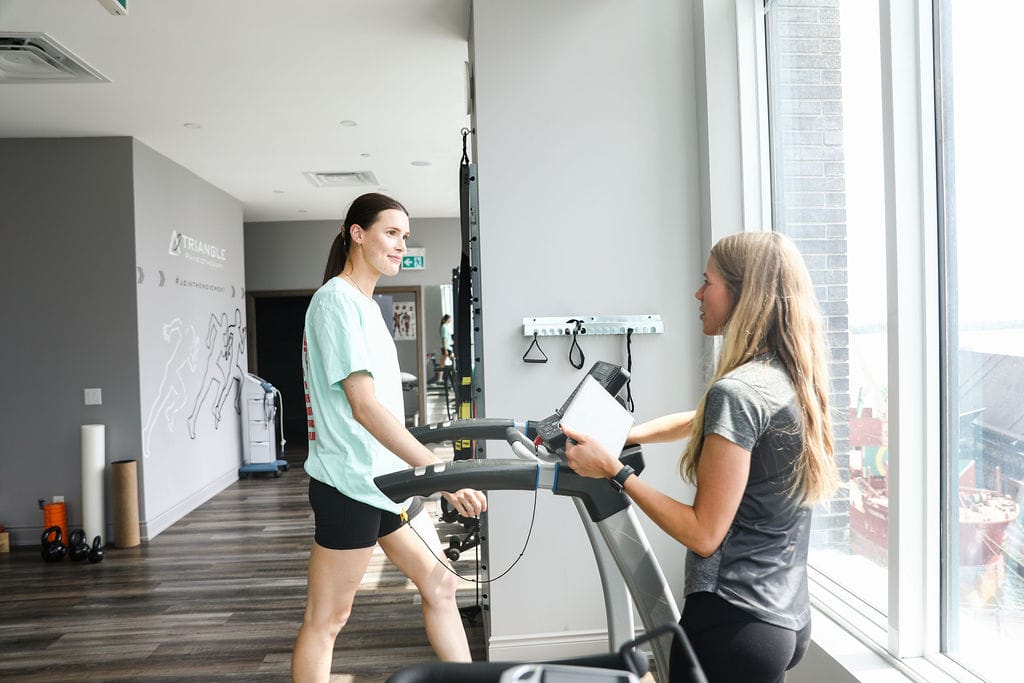
Key components of a running assessment may include:
- Gait Analysis: Observing the way an individual walks or runs to assess their biomechanics, stride length, foot strike pattern, and overall form.
- Footwear Analysis: Evaluating the type and condition of the running shoes worn by the individual to ensure they provide proper support and are suitable for their running style.
- Muscle and Joint Assessment: Checking for any muscle imbalances, weaknesses, or joint restrictions that may affect running mechanics.
- Injury History: Review the individual’s history of injuries, if any, to identify patterns or recurring issues that may be related to running technique.
- Functional Movement Assessment: Assessing the individual’s flexibility, strength, and stability, especially in areas relevant to running, such as the hips, knees, and ankles.
- Running on a Treadmill or Track: The individual may be observed while running on a treadmill or a track to get a real-time assessment of their running mechanics.
- Discussion of Training Goals: Understanding the individual’s running goals, whether they are training for a specific event, improving performance, or addressing pain or discomfort.
I am a novice runner, can I still do a running assessment?
Absolutely. As a novice runner, it is very important to learn the proper technique so that you don’t injure yourself. The physiotherapist will assess you and help you with technique, shoe selection, and a training plan if you want to run a marathon.
Where can I find a physiotherapist who does Running Assessments in Toronto?
We have 8 locations with physiotherapists to help you run better.
Click HERE to book an appointment with a physiotherapist at one of our eight locations.
- Physiotherapy Etobicoke – Triangle Physiotherapy Etobicoke
- Oakville Physiotherapy Clinic – Triangle Physiotherapy Oakville
- Physiotherapy North York – Triangle Physiotherapy North York
- Mississauga Physiotherapy Clinics – Triangle Physiotherapy Mississauga
- Downtown Physiotherapy Clinics – Triangle Physiotherapy King West
- Uptown Physiotherapy Clinics – Triangle Physiotherapy Lawrence Park
- Physiotherapy Clinic Downtown Toronto – Triangle Physiotherapy Queens Quay
- Physiotherapy Clinics Mississauga – Triangle Physiotherapy Erin Mills
A running assessment can help identify and correct biomechanical issues to improve performance and prevent injuries. For a comprehensive running assessment and personalized care, consider physiotherapy in Etobicoke, Oakville, North York, Toronto, Lawrence Park, Queens Quay, Erin Mills, Mississauga, or Liberty Village. Expert physiotherapists in these locations can help you optimize your running form and stay injury-free.
Back Pain is a common condition that affects a lot of people worldwide. The causes of back pain can vary from physical injuries to sports injuries and pregnancy.
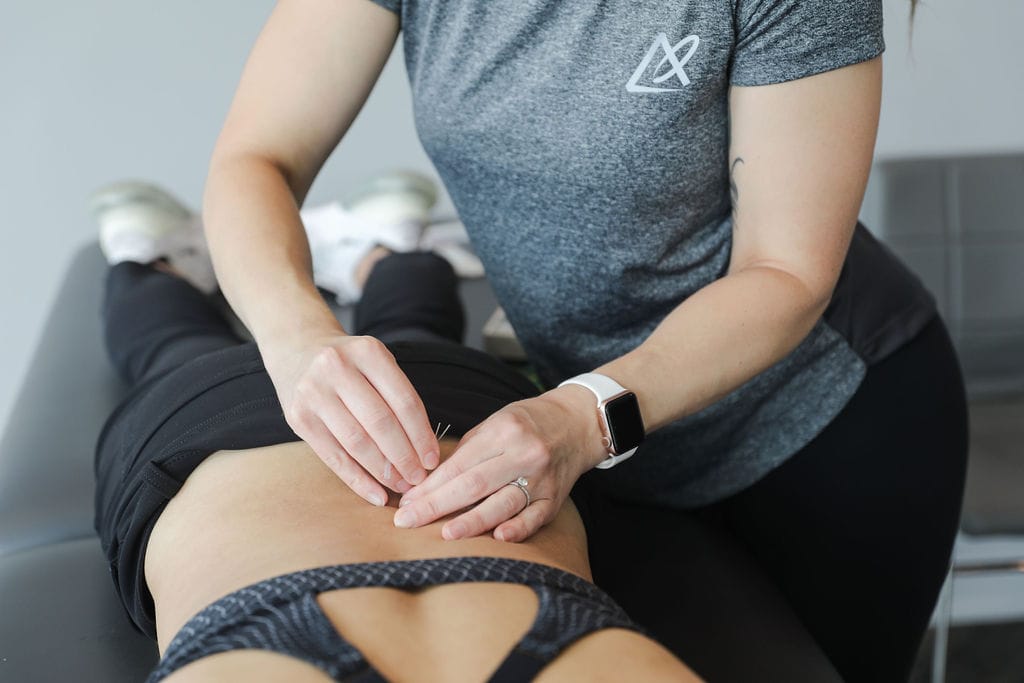
What are the causes of back pain?
Back pain can be caused due to various reasons like poor posture, overuse, or injury but many more causes can lead to back pain like inflammation and degenerative disc disease.
What are the common conditions of the back that the physiotherapists in Oakville can treat?
Some of the conditions most frequently treated by physiotherapists at our Physiotherapy Clinic in Oakville are:
- Sciatica
- Postural issues
- Degenerative Disc Disease
- Mechanical Back Pain
- Pregnancy-related back pain
- Disc Herniation
What type of treatments can help back pain?
At Triangle Physiotherapy Oakville, our physiotherapists use manual therapy, exercises, and pain management strategies to help with back pain. It is important to keep moving and staying active to avoid the recurrence of episodes.
Where can I find a physiotherapist in Oakville?
We have 8 locations with physiotherapists to help you.
- Pelvic Health Physiotherapy Etobicoke – Triangle Physiotherapy Etobicoke
- Oakville Pelvic Health – Triangle Physiotherapy Oakville
- Pelvic Health Physiotherapy North York – Triangle Physiotherapy North York
- Mississauga Pelvic Health – Triangle Physiotherapy Mississauga
- Downtown Pelvic Health – Triangle Physiotherapy King West
- Uptown Toronto Pelvic Health – Triangle Physiotherapy Lawrence Park
- Pelvic Physiotherapy Downtown Toronto – Triangle Physiotherapy Queens Quay
- Mississauga Pelvic Health – Triangle Physiotherapy Erin Mills
Our Oakville Physiotherapy Clinic is located only 2 lights West of Highway 403 on Dundas and 2 lights East of Trafalgar Road on Dundas.
“Effective back pain treatment is essential for improving your quality of life. Triangle Physiotherapy offers expert services across the GTA, including Physiotherapy in Etobicoke, Oakville, North York, Toronto, Lawrence Park, Queens Quay, Erin Mills, Mississauga, and Liberty Village. Our skilled physiotherapists are dedicated to helping you find relief from back pain and restore your mobility.”
Triangle Physiotherapy in Mississauga is a full-service clinic that offers specialized services like Pelvic Health Physiotherapy. Our pelvic health physiotherapists are trained professionals who, apart from being experts in their field, are also empathetic individuals who understand the sensitive nature of the conditions that make people seek pelvic health physiotherapy.
Tell me more about your Mississauga Pelvic Health physiotherapists.
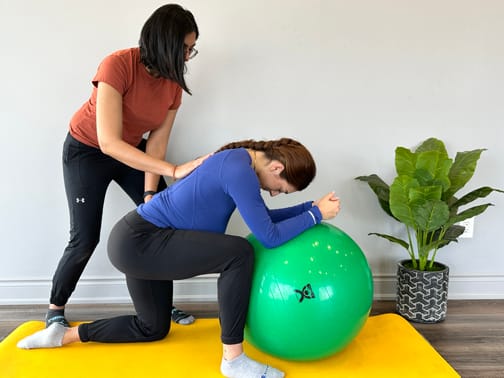
Our Mississauga Pelvic Health physiotherapists have training in the field of pelvic health physiotherapy and are committed to providing the best care to the community in Mississauga, be it new moms, women with prolapse or incontinence issues, pessary fittings, labour and delivery support, and more. We also have a pelvic health physiotherapist who is trained to help children. Our pelvic health physiotherapists are also able to help men with their pelvic health issues.
What type of conditions can a pelvic floor physiotherapist treat?
Some of the conditions treated by our Mississauga Pelvic Health physiotherapists are:
- Incontinence (urinary and fecal)
- Pelvic organ prolapse and pessary fittings
- Constipation
- Diastasis recti
- Vaginismus
- Pelvic pain
- Pelvic girdle pain during pregnancy and postpartum)
- Coccydynia (tailbone pain)
- Pudendal neuralgia
- Interstitial cystitis
- Female and Male Sexual dysfunction
- Prostatitis
- Rectal pain and dysfunction
- Irritable bowel syndrome
- Anal incontinence
- Anal fissures and fistulas
- Anal neuralgia
- Rectal prolapse
I just gave birth recently. How soon should I see a pelvic health physiotherapist
The pelvic floor muscles may get stretched or damaged during delivery, whether by C-Section or vaginal. This may cause issues of the pelvic floor that manifest as urinary or fecal incontinence, urinary urgency or frequency, pain during sexual activity, pelvic organ prolapse, pelvic pain, lower back pain, diastasis recti, or scar pain. Many of these issues can be addresed by pelvic health physiotherapy, however, our pelvic physiotherapists in Mississauga recommend waiting at least six weeks after delivery to allow the body time to heal from childbirth.
Can I speak to a pelvic health physiotherapist in Mississauga prior to booking a consultation?
We can certainly connect you with the best pelvic floor physiotherapist in Mississauga that can answer any questions you may have. Click here to book a discovery call.
Where can I find a pelvic health physiotherapist in Mississauga?
We have 8 locations with pelvic health physiotherapists to help you.
- Pelvic Health Physiotherapy Etobicoke – Triangle Physiotherapy Etobicoke
- Oakville Pelvic Health – Triangle Physiotherapy Oakville
- Pelvic Health Physiotherapy North York – Triangle Physiotherapy North York
- Mississauga Pelvic Health – Triangle Physiotherapy Mississauga
- Downtown Pelvic Health – Triangle Physiotherapy King West
- Uptown Toronto Pelvic Health – Triangle Physiotherapy Lawrence Park
- Pelvic Physiotherapy Downtown Toronto – Triangle Physiotherapy Queens Quay
- Mississauga Pelvic Health – Triangle Physiotherapy Erin Mills
“Finding the right pelvic health physiotherapist is crucial for effective treatment and recovery. Triangle Physiotherapy offers expert care across the GTA, including Physiotherapy in Etobicoke, Oakville, North York, Toronto, Lawrence Park, Queens Quay, Erin Mills, Mississauga, and Liberty Village. Our skilled physiotherapists specialize in pelvic health, providing personalized treatment plans to help you achieve the best possible outcomes.”
If you are considering chiropractic care in Oakville and have looked through Google to find a doctor to help you you have likely found countless options. This is when it becomes challenging to pick the chiropractor that is best for YOU. The next question you have probably asked yourself is what makes one Oakville Chiropractor different from the next, or “How do I find the best chiropractor for me?”
While this can feel like a daunting task, there are a few things that can set one chiropractor apart from another. These tips will go a long way in helping you find the best chiropractor for you in Oakville, and as a result, lead to better results for your health.
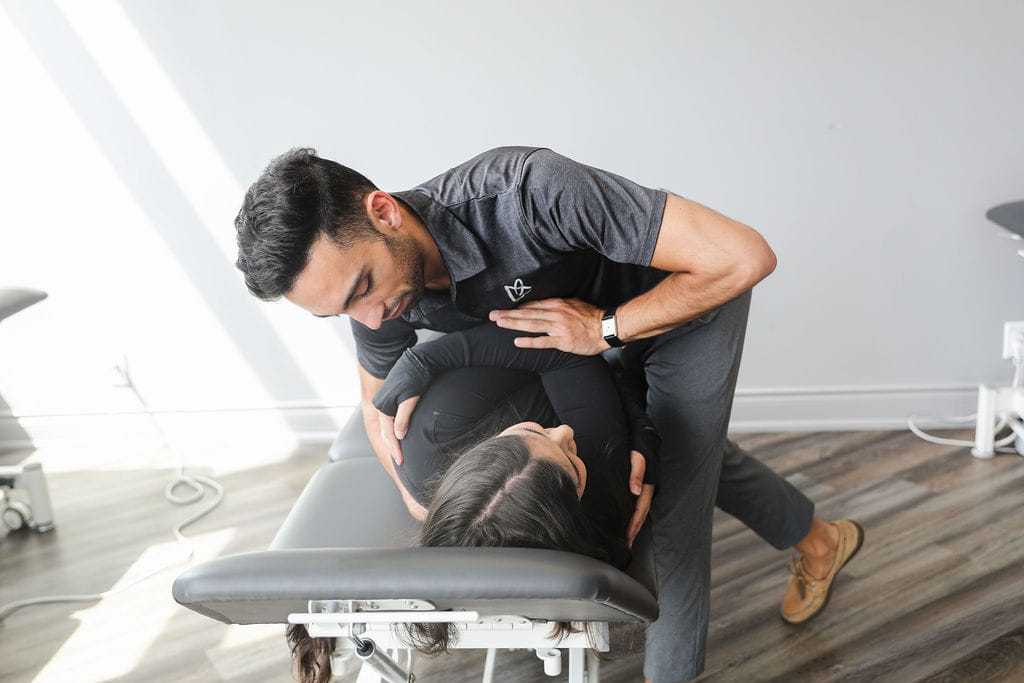
Tips for finding the best chiropractor in Oakville:
1. Start by asking trusted friends and relatives. Ask these people about their experiences with different chiropractors and who they would recommend to you. Referrals speak a lot about the practices of different chiropractic clinics.
2. Look up the online reviews for the clinics recommended to you or the ones you have looked up online during your search. Look for reviews on the chiropractor as well as the general customer service of the clinics.
3. Once you have narrowed your search, give the chosen clinic a call and ask for the chiropractor’s hours and availability to book an assessment and future follow-ups. This ensures that the timings match your availability.
4. When looking for a chiropractor many people don’t realize that there are several different techniques that they can use. The chiropractors at Triangle Physiotherapy are rehab-focused and their treatment style involves manual therapy, exercise prescription, and education.
When should I look into chiropractic care?
There are several reasons to seek chiropractic care. Back pain, neck pain, and headache are the most common reasons why patients first consult a chiropractor. Aside from these reasons, work, car accidents, sports injuries, household chores, and even the stress of daily living can cause painful joint and spinal problems. Remember, even if you do not have painful symptoms, chiropractic care can help you maintain a healthy spine and optimal joint function. Our chiropractors in Etobicoke, chiropractors in Mississauga, chiropractors in Oakville, and chiropractors in Toronto are skilled healthcare practitioners who can relieve your symptoms and get you back to doing what you love, pain-free.
What is a treatment session with a chiropractor like?
An initial visit with your Chiropractor usually involves a thorough history taking and assessment of your condition, in addition to an initial treatment to help set you on your road to recovery. Follow-up appointments will usually involve substantial manual treatment of your muscles and joints, as well as some therapeutic machines (e.g. Shockwave Therapy), acupuncture, and a home exercise program as needed. The Chiropractor may also recommend that you see a massage therapist to complement your treatment plan.
We hope this article has been helpful to you. While one chiropractor may be the best for one particular person you may find that another is the best for you. Doing your research can go a long way in the decision-making process.
If you have any further questions please feel free to contact our Oakville team today at Triangle Physiotherapy.
Our More Locations
Physiotherapy Etobicoke | Physiotherapy Oakville | Physiotherapy North York | Physiotherapy Toronto | Physiotherapy Lawrence Park | Physiotherapy Mississauga | Physiotherapy Queens Quay | Physiotherapy Mississauga Erin Mills | Physiotherapy Liberty Village
How do I book an appointment with a chiropractor near me?
Click HERE to book an appointment with a chiropractor at one of our eight locations.
- Chiropractor Etobicoke – Triangle Physiotherapy Etobicoke
- Oakville Chiropractic Clinic – Triangle Physiotherapy Oakville
- Chiropractic North York – Triangle Physiotherapy North York
- Mississauga Chiropractic Clinics – Triangle Physiotherapy Mississauga
- Downtown Chiropractic Clinics – Triangle Physiotherapy King West
- Uptown Chiropractic Clinics – Triangle Physiotherapy Lawrence Park
- Chiropractic Clinic Downtown Toronto – Triangle Physiotherapy Queens Quay
- Chiropractor Mississauga – Triangle Physiotherapy Erin Mills
Finding the right chiropractor in Oakville is essential for effective care and recovery. If you’re also considering physiotherapy for a holistic approach to your health, explore options for physiotherapy in Etobicoke, Oakville, North York, Toronto, Lawrence Park, Queens Quay, Erin Mills, Mississauga, or Liberty Village. Experienced physiotherapists in these areas can complement chiropractic care and help you achieve optimal wellness.
The holidays are around the corner, and so is all the pressure and stress that can tag along with them. Holiday stress is hard to avoid between work, family responsibilities, and a schedule packed with social commitments — but it’s easier to manage stress with massage therapy. Massage therapy can help you destress, unwind, and be ready to enjoy the holiday season.
How can massage therapy help with relieving holiday season stress?
Here are some ways in which massage can help alleviate holiday stress:
- Relaxation: Massage is known for its ability to induce relaxation. The physical manipulation of muscles helps release tension and promotes a sense of calm. This can be particularly beneficial during the hectic holiday season when stress levels tend to be higher.
- Reduced Muscle Tension: The physical demands of holiday preparations, such as shopping, cooking, and decorating, can lead to muscle tension and discomfort. Massage can target specific areas of tension, helping to release tight muscles and improve flexibility.
- Improved Sleep: The holiday season can disrupt regular sleep patterns due to increased activities and stress. Massage has been shown to improve sleep quality by promoting relaxation and reducing anxiety. Better sleep can contribute to overall well-being.
- Stress Reduction: Massage therapy has been linked to a reduction in stress hormones such as cortisol. Regular massage sessions can help regulate stress levels and promote a sense of well-being.
- Enhanced Mood: Massage stimulates the release of endorphins, the body’s natural feel-good chemicals. This can help improve mood and reduce feelings of anxiety or depression, which can be exacerbated during the holiday season.
- Increased Body Awareness: Massage encourages mindfulness and awareness of the body. Focusing on the present moment can help individuals let go of worries about the past or future, promoting a sense of peace and tranquility.
- Improved Circulation: The physical manipulation of muscles during massage promotes better blood circulation. Improved circulation can help reduce inflammation, support the immune system, and contribute to overall health.
- Time for Self-Care: The holiday season often involves taking care of others, which can leave little time for self-care. Scheduling a massage provides dedicated time for self-nurturing, allowing individuals to prioritize their well-being.
- Human Connection: Massage therapy involves human touch, which can have a positive impact on emotional well-being. The connection with a massage therapist can provide a sense of comfort and support.
- Mind-Body Connection: Massage emphasizes the interconnectedness of the mind and body. Taking the time for a massage can help individuals reconnect with their bodies, fostering a holistic approach to health.
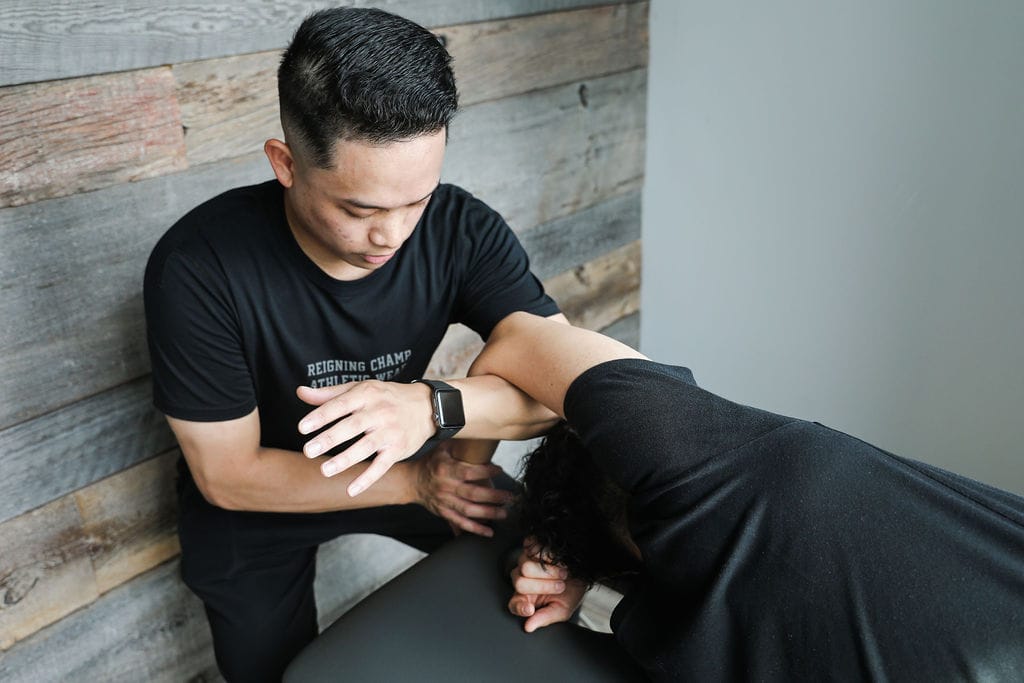
How do I book an appointment with a massage therapist near me?
Click HERE to book an appointment with a physiotherapist or chiropractor at one of our eight locations.
- Massage Therapy Etobicoke – Triangle Physiotherapy Etobicoke
- Oakville Massage Therapy Clinic – Triangle Physiotherapy Oakville
- RMT North York – Triangle Physiotherapy North York
- Mississauga Massage Therapy Clinics – Triangle Physiotherapy Mississauga
- Downtown RMT Clinics – Triangle Physiotherapy King West
- Massage Therapy Yonge and Eglinton – Triangle Physiotherapy Lawrence Park
- RMT Downtown Toronto – Triangle Physiotherapy Queens Quay
- RMT Mississauga – Triangle Physiotherapy Erin Mills
Massage therapy is a great way to relieve stress during the holiday season, reduce muscle tension, and promote relaxation. If you’re looking for professional physiotherapy services to complement your massage therapy and enhance your overall well-being, consider clinics in physiotherapy Etobicoke, Oakville, North York, Toronto, Lawrence Park, Queens Quay, Erin Mills, Mississauga, and Liberty Village. These clinics offer expert care and personalized treatment plans to support your health and relaxation needs.






